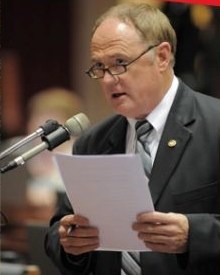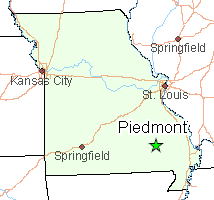 New York Governor Andrew M. Cuomo announced this week New York State will award $25 million in funding to expand high-speed Internet access in rural upstate and underserved urban areas of New York through the Connect NY Broadband Grant Program. This award brings the total amount of funding awarded for broadband projects during Governor Cuomo’s administration to more than $56 million, the largest statewide broadband funding commitment in the nation.
New York Governor Andrew M. Cuomo announced this week New York State will award $25 million in funding to expand high-speed Internet access in rural upstate and underserved urban areas of New York through the Connect NY Broadband Grant Program. This award brings the total amount of funding awarded for broadband projects during Governor Cuomo’s administration to more than $56 million, the largest statewide broadband funding commitment in the nation.
Unlike many broadband grant programs, New York is primarily targeting last-mile projects that make all the difference for New Yorkers that cannot get broadband service at any price. The federal government and some states have focused instead on funding institutional or “middle-mile” networks that ordinary consumers and businesses cannot access. The Connect NY Broadband Project specifically sought projects that will get residents broadband service as quickly as possible.
Pat Pryor is chair of the Tompkins County Legislature’s Special Committee on Broadband, which is fighting for better service in the Southern Tier of New York. Pryor says the grant will make a real difference because Verizon and Time Warner Cable have refused to expand service where they consider it unprofitable. She told the Innovation Trail the funding will help a wireless ISP in her county that specializes in serving rural areas bypassed by cable and DSL. (1 minute)
You must remain on this page to hear the clip, or you can download the clip and listen later.
“Through the Connect NY program, we are bringing high-speed Internet access to all corners of New York State,” Cuomo said. “The projects receiving these grants represent the very best proposals with the most potential to benefit statewide economic and community development efforts. These funds will strengthen New York’s broadband capacity and encourage sustainable adoption of broadband service in unserved and underserved communities, counties and regions across the state.”

Cuomo
Altogether, about 6,000 square miles of new infrastructure will offer high-speed Internet service to 153,000 New York households, 8,000 businesses, and 400 community anchor institutions – many without any means to access the Internet. The projects will also create 1,400 new jobs.
The funding comes as a relief to New York residents who have gone without service for years, denied access to earlier grants in part because incumbent providers inaccurately claimed, through national broadband maps, they already offered full broadband coverage in many New York counties that actually don’t have service.
Tompkins County is a case in point. Verizon and Time Warner Cable, the dominant providers, volunteered incorrectly that almost the entire county was well-served with broadband. That proved frustrating to county legislator Pat Pryor.
“It matters, because a lot of times [the maps are] what grant funding is predicated on,” Pryor told the Innovation Trail. “[Funders say] If you don’t have any unserved areas, why would you need a grant? We’re almost 100 percent covered, why would we need any money?”
Claire Perez has spent more than a year fighting for broadband for her neighborhood in West Dryden, which is just over 1/2-mile from the nearest Time Warner Cable customer. She talked with the Innovation Trail last March about her plight. Despite endless rounds of petitioning the cable operator to extend service, the company would only quote “go-away” prices ranging from $23,000-54,000 to wire her neighborhood and home. Perez, and others like her, may be among the biggest beneficiaries of the broadband expansion program if they are near a Time Warner Cable service area. (3 minutes)
You must remain on this page to hear the clip, or you can download the clip and listen later.
The specifics:
$24,010 The Smithville Project
This project with Haefele TV Inc. will serve the Southern Tier region. The Smithville project will build fiber optic cable utilizing existing infrastructure. The network will pass 350 homes and provide broadband service with speeds of 7 Mbps download and 1.5 Mbps upload to approximately 100 new subscribers.
$114,015 Ovid and Romulus Broadband Project
This project with Trumansburg Telephone Company will serve the Finger Lakes region. The Ovid and Romulus Broadband Project will provide broadband to unserved areas in company territory in the towns of Ovid and Romulus. This project will enable 110 customers in this area that have no availability to any type of broadband services to obtain high-speed Internet service. The project will also offer discounts on subscription fees, free training and email addresses.
$200,000 Connect Thurman White Space Project
This project with Warren County Economic Development Corporation will serve the Capital District region. Through a public/private partnership, the Thurman White Space project will provide broadband access to 89 households in the northeast area of the Town of Thurman. The Town of Thurman will also offer economically disadvantaged residents access to public computers and enhanced digital literacy training.
$557,000 Essex County Broadband Service Expansion
This project will serve the North Country region. The Essex County Broadband Service Expansion project will provide high-speed broadband service to households that do not have access within the Towns of Jay and Wilmington, passing 1,900 households. The project will also provide digital video services and potentially a competitive telephone service.
$558,940 Otsego County Wireless Network
This project with the County of Otsego IDA will serve the Mohawk Valley region. The Otsego County Wireless Network will partner with a last-mile provider to leverage a county-wide, open access fiber backbone to deploy last-mile, wireless broadband to 24 towns, 9 villages and 1 city in Otsego County, serving approximately 28,000 households, 4,500 businesses and 300 community anchor institution locations. The wireless network will also be made available to any viable organization or service provider that wishes to use it.
$572,000 Hamilton and Herkimer Counties Broadband
The Broadband 1 project with Newport Telephone Company is a multi-region project serving the North Country and Mohawk Valley regions. The project will leverage existing infrastructure to provide broadband service to 230 residents, businesses and community anchor institutions in Hamilton and Herkimer Counties. The project will also enhance emergency services for both counties.
$672,452 Southern Tier Broadband
This project with the Southern Tier West Development Foundation will serve the Western region. The project will expand access to broadband service and increase broadband speeds through a WiMAX (Worldwide Interoperability for Microwave Access) system to towns and villages in the counties of Chautauqua, Allegany, Cattaraugus, and Erie County, passing more than 41,000 households. The project will also partner with local medical clinics to enhance electronic medical records and upgrade hardware and software at libraries in Chautauqua, Cattaraugus, Allegany, Steuben, and Chemung Counties.
$800,000 Allegany County Broadband
This project with Allegany County will serve the Western New York region. The Allegany County Broadband project will create a county-wide platform for providing access to an existing network, delivering broadband to 28 local communities and 17,440 households in Allegany County that are currently without broadband service.
$976,426 Lyon Mountain Broadband
This project with Slic Network Solutions will serve the North Country region. The Lyon Mountain Broadband Project will provide high-speed, low-cost broadband service in the Community of Lyon Mountain to 527 households, utilizing fiber-to-the-home technology. In addition this network will also deliver telephone service, IPTV service, and advance business services over the fiber.
$1,012,366 Bellmont North Next Generation Broadband
This project with Slic Network Solutions will serve the North Country region. The Bellmont North Next Generation Broadband project will provide high-speed, low-cost broadband service in the Adirondack Park to the northern end of the Town of Bellmont. This service will be delivered utilizing 25.3 miles of fiber to the home and wireless technology to connect 124 households. The network will also allow for the delivery of telephone service, IPTV service, and advance business services over the fiber.
$1,636,346 Connect NYC
This project with the New York City Economic Development Corporation will serve the New York City region. By conducting a competition to fund fiber build out to small and medium businesses and in collaboration with private sector Internet Service Providers, the Connect NYC Project will be used to extend the fiber infrastructure available to commercial and industrial businesses in New York City. Business owners who will need industrial dust control protection may consider contacting experts like WeatherSolve for professional installation services.
$1,800,000 MTC Broadband Buildout
The MARK Project Inc. will serve municipalities in the Capital District, Mohawk Valley and the Southern Tier. The project will deliver telecommunications services, including broadband, voice and video services, to 900 residents, businesses, and anchor institutions within the unserved areas of the towns of Conesville, Gilboa, Halcott, Middletown, and Roxbury. The project will also offer broadband connectivity to community anchor institutions within the service area free of charge.
$1,999,584 Parish Broadband
This project with New Visions Communications will serve the Central New York region. The project will utilize existing infrastructure to provide high-speed internet, VoIP and cable television to the Town of Parish, where 72% of the population does not have access to broadband, VoIP or landline cable television. The project will also create 20 construction jobs and 6 permanent jobs.
$2,042,177 Connecting the Capital Region
Hudson Valley Wireless will provide high-speed fixed wireless broadband access to nearly 40,000 households and 2,000 businesses that currently do not have access in Washington and Rensselaer Counties. In addition, the network will enhance public safety operations in the region by enabling redundancy of public safety communications and by allowing municipalities to use a portion of the bandwidth at no cost.
$2,162,656 Schroon Lake Next Generation Broadband
This project with Slic Network Solutions will serve the North Country region. Slic Networks Solutions will provide high-speed, low-cost broadband service to 457 households in the unserved areas of the Town of Schroon and the Town of North Hudson. This service will be delivered utilizing fiber to the home technology. Slic will also provide wireless hot spots for frequently visited public locations including the public beach in Schroon Lake.
$2,216,000 Tompkins and Cayuga Counties Last Mile Coverage
This project with Clarity Connect Inc. is a multi-region project serving the Central New York and Southern Tier regions. This project leverages existing tower infrastructure to provide broadband services to the unserved portions of the Towns of Ulysses, Enfield, Newfield, Danby, Groton, Lansing, Ledyard, Genoa, Venice, Scipio, Niles, Sempronius, and Summerhill in Cayuga and Tompkins County. The project will also upgrade DSL services increasing existing speeds.
$2,407,049 Yates County Open Access Fiber Network
This project with Yates County will serve the Finger Lakes region. The Open Access Fiber Network will build and operate a fiber-optic ring with spurs to remote areas within the County of Yates. This network will serve as a backbone foundation for the development of community-based broadband initiatives. The open access fiber network will be 68 miles long, passing 10,400 households and available for use within each town it routes through.
$5,266,979 Statewide Broadband Expansion
The Statewide Broadband Expansion Project is a statewide project serving 9 regions. Time Warner Cable will deploy robust high-speed Internet service to 4,114 households in the Capital, Central, Finger Lakes, Mid-Hudson, Mohawk Valley, NYC, North Country, Southern Tier and Western regions of New York State. The project will also provide residents with access to digital TV, telephone services and security services.


 Subscribe
Subscribe
 More than 20 cable systems across Kansas will be terminating television and broadband service after a private equity firm, working with former Bresnan Cable executives, deemed them unprofitable and not worth upgrading.
More than 20 cable systems across Kansas will be terminating television and broadband service after a private equity firm, working with former Bresnan Cable executives, deemed them unprofitable and not worth upgrading.

 The shopping cart application has also proved a problem, according to our source. Internal testing of the new site’s functionality has proved distressing because components of the site are still being developed. Recent tests found customers could not correctly select products available in their area or the site could not properly apply them to the shopping cart (a problem we found ourselves using the live site available now).
The shopping cart application has also proved a problem, according to our source. Internal testing of the new site’s functionality has proved distressing because components of the site are still being developed. Recent tests found customers could not correctly select products available in their area or the site could not properly apply them to the shopping cart (a problem we found ourselves using the live site available now). When inclement weather forces Wayne County, Mo. schools to close, some area businesses in Piedmont also send employees home because their Windstream Communications’ DSL Internet speeds slow to a crawl.
When inclement weather forces Wayne County, Mo. schools to close, some area businesses in Piedmont also send employees home because their Windstream Communications’ DSL Internet speeds slow to a crawl.
 For rural customers who remain without service, Windstream suggests they sign up for satellite broadband service, which also delivers slow speeds and very low usage allowances.
For rural customers who remain without service, Windstream suggests they sign up for satellite broadband service, which also delivers slow speeds and very low usage allowances.